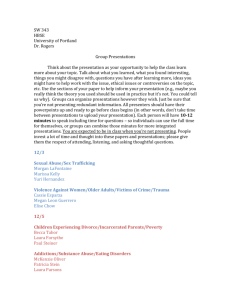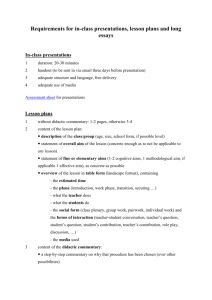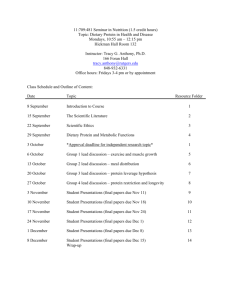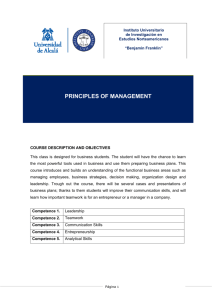Law of International Organisations
advertisement
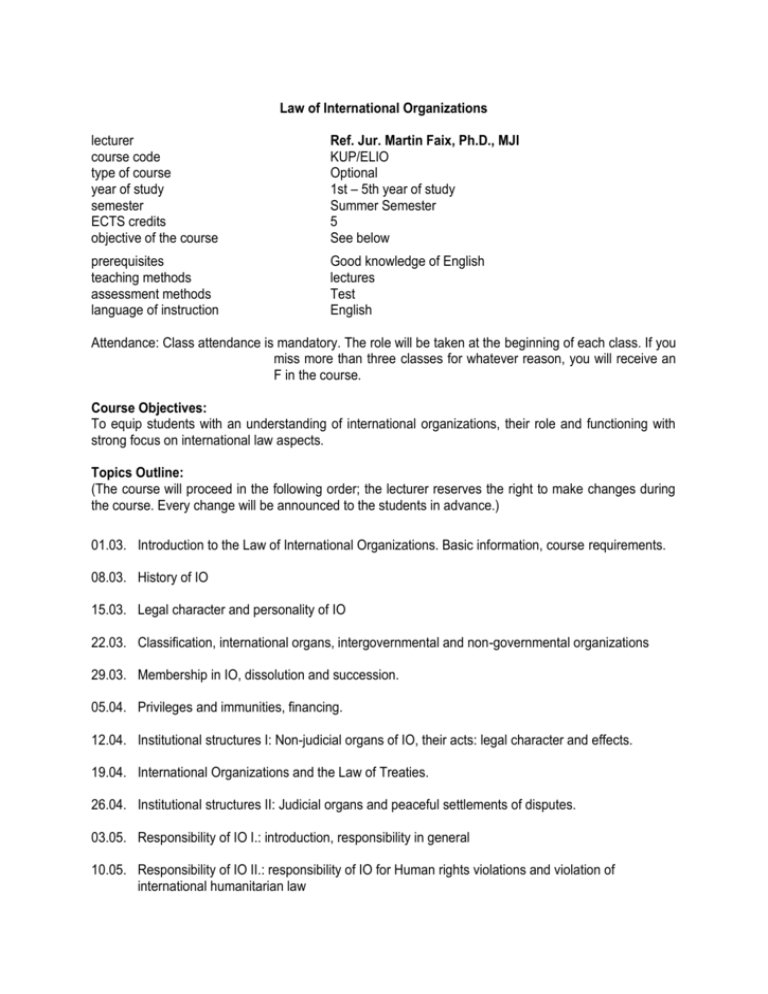
Law of International Organizations lecturer course code type of course year of study semester ECTS credits objective of the course Ref. Jur. Martin Faix, Ph.D., MJI KUP/ELIO Optional 1st – 5th year of study Summer Semester 5 See below prerequisites teaching methods assessment methods language of instruction Good knowledge of English lectures Test English Attendance: Class attendance is mandatory. The role will be taken at the beginning of each class. If you miss more than three classes for whatever reason, you will receive an F in the course. Course Objectives: To equip students with an understanding of international organizations, their role and functioning with strong focus on international law aspects. Topics Outline: (The course will proceed in the following order; the lecturer reserves the right to make changes during the course. Every change will be announced to the students in advance.) 01.03. Introduction to the Law of International Organizations. Basic information, course requirements. 08.03. History of IO 15.03. Legal character and personality of IO 22.03. Classification, international organs, intergovernmental and non-governmental organizations 29.03. Membership in IO, dissolution and succession. 05.04. Privileges and immunities, financing. 12.04. Institutional structures I: Non-judicial organs of IO, their acts: legal character and effects. 19.04. International Organizations and the Law of Treaties. 26.04. Institutional structures II: Judicial organs and peaceful settlements of disputes. 03.05. Responsibility of IO I.: introduction, responsibility in general 10.05. Responsibility of IO II.: responsibility of IO for Human rights violations and violation of international humanitarian law 17.05. European Union as an international organization from the perspective of international law Assessment: There is no final examination for this course. Your grade will be based on (1) your attendance, (2) your active participation in the course and (3) your performance on in-class group presentations. Each group will be assigned a topic on which it prepares a presentation followed by/including a short discussion. The topics of the presentations are indicated below. Presentations should be creative and informative and include a discussion, ie. each group needs to prepare a discussion on the assigned topic (5-10 min). The length of presentations should be 30 minutes (including discussion). Each presentation must be accompanied by a handout (1-2 pages) for your colleagues. The handout shall summarize your findings in brief and give your colleagues an overview about the topic of your presentation. Each group member must participate in the in-class presentation in order to receive credit for the assignment. Groups must turn in their presentation, the handout and discussion questions to the lecturer one week before the in class presentation at the latest, both in hardcopy and via email. Finally, please ensure that your presentations meet the standard formal requirements (bibliography, etc.). In case of plagiarism, you will receive an F in the course. Please note that reading and other preparation for the course will be expected. You are also required to check the electronic blackboard regularly for materials and announcements. Topics for presentation: 1. Case Bankovič v. Belgium and sixteen other states, 12 December 2001 2. Joined Cases Behrami and Behrami v. France, and Saramati v. France and others, 2 May 2007 3. Reform of the UN: Security Council 4. Reform of the UN: Democracy, Financing and Human Rights issues 5. UN and HR: Universal Periodic Review 6. UN and the ICC 7. EU and the ECHR 8. Does the EU have obligations under human rights law? 9. The international legal status of the EU 10. Cases (CFI) T-306/01 Yusuf and Al Barakaat International Foundation v. Council and Commission, and T-315/01 Kadi v. Council and Commission (Judicial Review of European AntiTerrorism Measures) 11. International Committee of the Red Cross from international law perspective 12. OSCE from the perspective of international institutional law 13. ICC from the perspective of international institutional law 14. The International Tin Council case (Liability to Third Parties of Member States of International Organizations)





